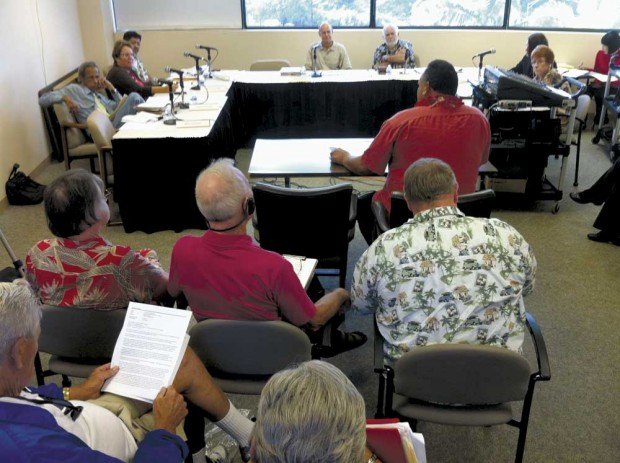LIHU‘E — The county Board of Ethics on Tuesday ruled Board and Commissions Administrator John Isobe did not act improperly when assisting the Salary Commission in crafting a resolution that froze the wages of most county officials. In a packed
LIHU‘E — The county Board of Ethics on Tuesday ruled Board and Commissions Administrator John Isobe did not act improperly when assisting the Salary Commission in crafting a resolution that froze the wages of most county officials.
In a packed Liquor Conference room, Mayor Bernard Carvalho Jr., visibly bothered by testifying at the meeting, said all he did was send a communication recommending that his own salary be frozen.
“The issue before you relates to a matter that I wrote to the Salary Commission asking for their assistance in assuring that if our union employees were not to receive a pay raise this year, then I myself would not receive a pay raise,” said Carvalho, adding there were no hidden agendas. “There was nothing to gain for myself or anyone who works for me.”
If sending a simple four-paragraph letter asking for consideration rather than issuing an order and taking no further action is deemed to be interfering in the matters of the commission, the mayor said, “then I supposed I’m guilty as charged.”
Carvalho called the allegations against Isobe baseless and without regard for the “very reason” Isobe’s position exists: to provide support for the various boards and commissions.
Councilman Mel Rapozo, who had prepared a formal complaint against the commission and five council members but never officially filed it, said Carvalho’s letter was not what triggered his questions.
“The mayor did the noble thing by submitting a letter about his own salary,” he said.
Eleven days after Carvalho’s letter, Isobe had a resolution drafted and ready for introduction at the following commission meeting. The resolution proposed a salary freeze for the mayor and every other department head or appointing authority, although Carvalho’s letter only mentioned the mayor’s salary.
“How would Mr. Isobe know what to put in the resolution without having met with the commission?” Rapozo asked. “That is a serious problem … which should indicate to me that there was some discussion amongst the commissioners and Mr. Isobe prior to the meeting date, which is a violation of the Sunshine Law.”
The final draft of the resolution had an amendment raising Isobe’s salary while everyone else had their salaries frozen at least until July 1, 2013. Isobe makes $103,041 annually. His salary is set by the resolution as if it were effective Dec. 1, 2008. But Rapozo said Isobe was making less than that a year ago, and he was unsure if the amendment raising Isobe’s salary would be retroactive.
Mishandled process
Commission Chair Charles King said he asked Isobe for a pre-meeting with himself and staff member Paula Murakami because he wanted to have a resolution ready to present at the commission meeting.
“It’s not unusual for me to have meetings beforehand with John (Isobe),” he said.
Councilman Tim Bynum defended Isobe and King, saying if a commissioner asks Isobe for some help, that’s why he is there.
“I trust in the independence of the Salary Commission,” he said.
King and Commissioner Bill Dahle said there was no pressure or influence from Isobe in passing the resolution.
Isobe said he and King had conversations about how they should proceed with the resolution, but it was not his intention to tell the commission what they should do.
“When we talk about transparency, the Office of Boards and Commissions, the Salary Commission followed the law, and in fact have gone beyond the requirements of the Sunshine Law to ensure that everyone is well-informed,” Isobe said.
Board of Ethics Chair Paul Weil had a different opinion.
He told Isobe he could have done a better job to inform the public and that the duties and responsibilities of the Boards and Commissions staff should be clarified.
“Your staff is so skilled, so dedicated, we expect more,” Weil said.
When a motion was called to affirm that Isobe had not acted improperly in assisting the commission with the resolution, the roll call seemed headed for a unanimous vote.
But Weil stood his ground.
“I vote no; I really think it was mishandled,” he said.
Weil’s dissenting vote prompted Commissioner Mark Hubbard to add he thought the process was handled properly.
“Well, you expressed that by voting yes,” Weil said before closing the matter.
No complaint
Following the vote, Rapozo withdrew his communication to avoid duplicating the discussion.
He said he agreed with the board’s ruling and would not file an official complaint in Fifth Circuit Court.
Rapozo’s complaint was already typed, naming him and Councilman KipuKai Kuali‘i as plaintiffs, and every other council member and the Salary Commission as defendants. The complaint said the resolution became effective Oct. 4, but should not have been valid because it was sent to the council almost five months past the deadline of March 15.
By withdrawing his communication, Rapozo saved the board from going into another set of discussions, this time behind closed doors, on the same matter.
Despite telling Weil he agreed with the board’s decision and that he would not file a legal complaint, Rapozo left the meeting rather angry at the ruling.
Visit www.kauai.gov for more information.
• Léo Azambuja, staff writer, can be reached at 245-3681 (ext. 252) or lazambuja@ thegardenisland.com.


